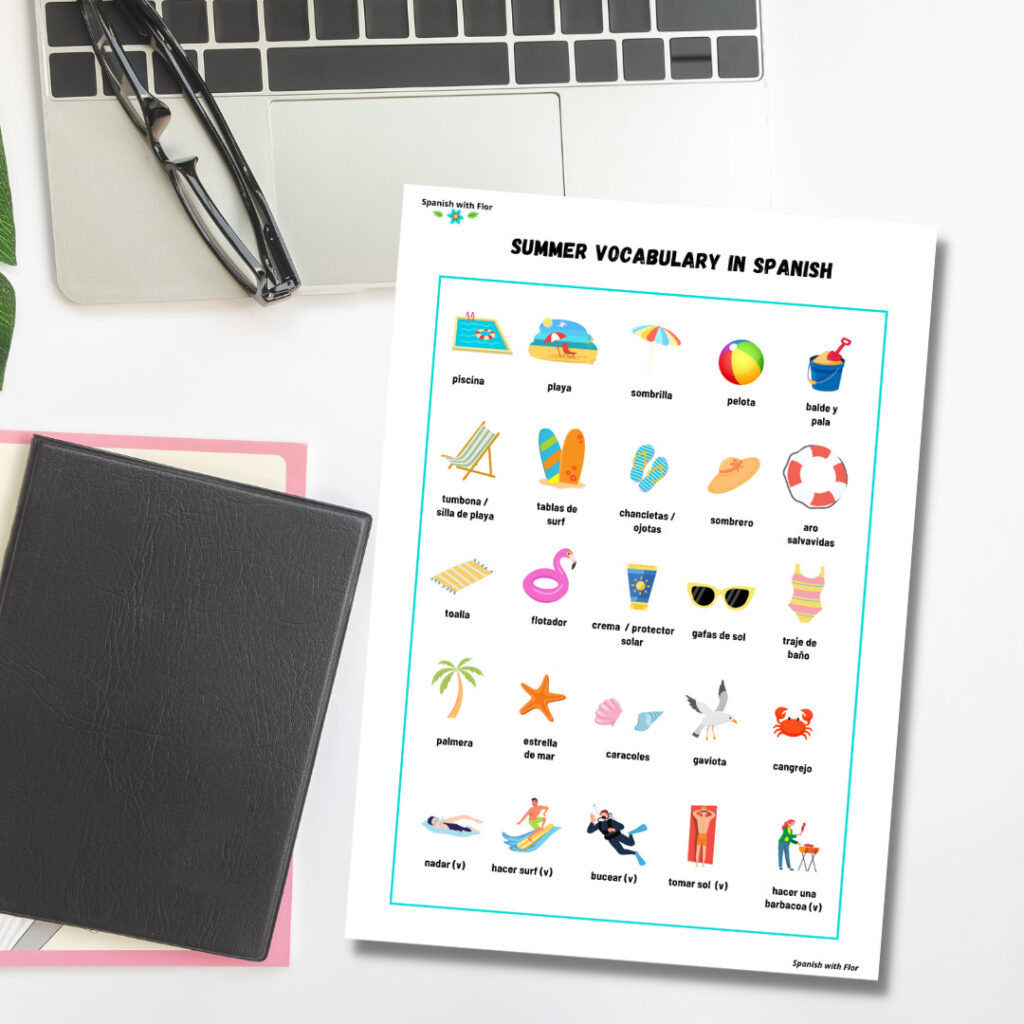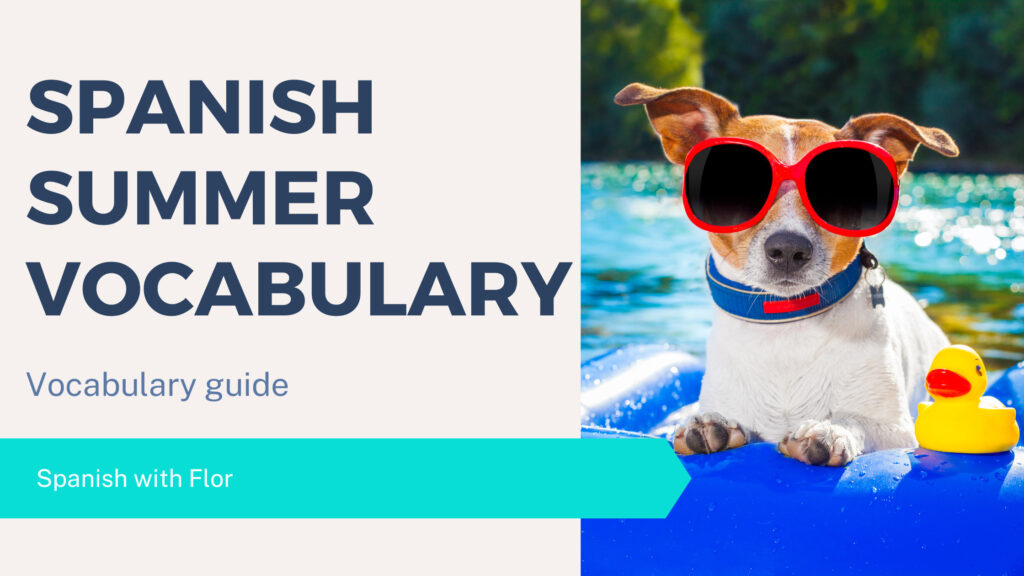Summer is a time for outdoor activities, relaxation, and travel. If you’re planning to spend your summer vacation in a Spanish-speaking country or simply want to learn some new vocabulary, it’s essential to know some Spanish summer words. In this article, I’ll introduce you to some of the most common Spanish summer vocabulary, including phrases and expressions that will help you communicate with locals.
Learning Spanish summer vocabulary will not only enhance your travel experience, but it will also help you to communicate more effectively with Spanish speakers. Whether you’re ordering a refreshing drink or asking for directions to the beach, knowing the right words can make all the difference.
Some of the most common Spanish summer words include “playa” (beach), “sol” (sun), “piscina” (swimming pool), “helado” (ice cream), “barbacoa” (barbecue), and “vacaciones” (vacation). By learning these words, you’ll be able to describe your summer activities and experiences in Spanish.
Beach Words in Spanish
When you’re planning a beach vacation in a Spanish-speaking country, it’s important to know some essential beach vocabulary. Here’s a table summarizing some of the key beach vocabulary in Spanish:
| English | Spanish |
|---|---|
| summer vacations / holidays | vacaciones de verano |
| beach | la playa |
| sea | mar |
| ocean | océano |
| sand | la arena |
| tide | la marea |
| waves | las olas |
| shore | la orilla |
| shell | la concha / caracol |
| crab | el cangrejo |
| dolphin | delfín |
| whale | ballena |
| killer whale | orca |
| starfish | estrella de mar |
| bathing suit | el bañador |
| flip flops | las chanclas / chancletas / ojotas |
| sunglasses | las gafas de sol |
| hat | sombrero |
| towel | toalla |
| beach chair | silla de playa / tumbona |
| beach bag | bolso de playa |
| tan | bronceado |
| summer camp | campamento de verano |
| icecream | helado |
| sunblock | el bloqueador solar |
| sunny | soleado |
| to be hot | hacer calor |
| high temperature | temperatura alta |
Beach Activities Vocabulary
If you’re an active person, you’ll love the variety of sports and recreation activities available during the summer. If you plan on swimming, surfing, or snorkeling, you’ll need to know some key verbs and nouns. Here’s a table with beach activities in Spanish:
| English | Spanish |
|---|---|
| to play beach volleyball | jugar voleibol de playa |
| to make a sandcastle | hacer un castillo de arena |
| to fly a kite | volar una cometa / barrilete |
| to swim | nadar |
| to surf | hacer surf/surfear |
| to snorkel | hacer snorkel |
| to sunbathe | tomar sol |
Download a list with the most important summer words in Spanish!

Summer Foods and Drinks in Spanish
When it comes to summer, one of the best things to enjoy is the abundance of fresh fruits and snacks. Here you have a list with some popular food to enjoy during the summer at the beach.
| English | Spanish |
|---|---|
| fruit | fruta / frutas |
| watermelon | sandía |
| mango | mango |
| pineapple | piña / ananá |
| grapes | uvas |
| lemon | limón |
| orange | naranja |
| snacks | bocadillos / tentempiés / snacks |
| lemonade | limonada |
| ice lolly | paleta helada |
| salad | ensalada |
| hamburger | hamburguesa |
| french fries | patatas / papas fritas |
| hot dog | perro caliente / pancho |
| seafood | mariscos |
| prawns | gambas |
| fish | pescado |
| oysters | ostras |
| octopus | pulpo |
| cod | bacalao |
| salmon fillet | filete de salmón |
| salmon roe | huevas de salmón |
| swordfish | pez espada |
| scallop | vieira |
| squid | calamar |
| fried | frito |
| grilled | asado |
| beverages | bebidas |
| juice | zumo / jugo |
| vino blanco | white wine |
| ice cubes | hielo |
| water | agua |
If you’re looking for a refreshing snack, you can try “helado,” which is ice cream in Spanish. Helado comes in many different flavors, such as “chocolate“, “vainilla“, and “fresa / frutilla” (strawberry). You can find it at most ice cream shops or markets.
If you’re looking for something a little more exciting, you can try “sangría,” which is a refreshing wine-based drink. It’s made with red wine, chopped fruit, and a sweetener. You can find it at most bars or restaurants.
Practice Spanish Summer Vocabulary with this interactive exercise here!
Outdoor Activities in Spanish
If you prefer to spend your summer exploring the great outdoors, there are plenty of options for you as well. Here are some of the most popular nature and exploration activities:
- Pescar: Fishing is a relaxing and rewarding activity that’s great for people of all ages. You might fish in a lake (lago) or a river (río), and you’ll need a fishing rod (caña de pescar) and bait (cebo) to get started.
- Senderismo: Hiking is a popular activity in many Spanish-speaking countries. You might explore a national park (parque nacional) or a mountain range (sierra) on foot, and you’ll need good hiking shoes (zapatos de senderismo) and plenty of water (agua) to stay comfortable.
- Vacaciones de verano: Summer Vacation is the perfect time to travel (viajar) and explore new places. Whether you’re heading to the beach (playa) or the mountains (montañas), you’ll need to pack your bags (empacar tus maletas) and plan your itinerary (planificar tu itinerario) in advance.
No matter what your interests are, there are plenty of outdoor summer activities to enjoy in Spanish-speaking countries. So get out there and have some fun!
Travel Vocabulary in Spanish
Planning a summer trip in Spanish is very exciting and fun, but it can also be challenging if you don’t know the language. Here are some useful phrases and vocabulary words to help you plan your trip to a Spanish-speaking country.
When planning your trip, you’ll need to make travel arrangements, such as booking flights, renting a car, or taking public transportation. Here are some phrases to help you with your travel arrangements:
- ¿Cómo puedo reservar un vuelo? (How can I book a flight?)
- ¿Dónde está la taquilla de autobuses? (Where is the bus ticket office?)
- ¿Cuánto cuesta un billete de tren? (How much is a train ticket?)
- ¿Hay un servicio de alquiler de coches cerca? (Is there a car rental service nearby?)
Once you arrive at your destination, you’ll need to find accommodation and plan your activities. Here are some phrases to help you with your accommodation and logistics:
- ¿Dónde está el hotel más cercano? (Where is the nearest hotel?)
- ¿Cuánto cuesta una habitación doble? (How much is a double room?)
- ¿Hay habitaciones disponibles para esta noche? (Are there rooms available for tonight?)
- ¿Dónde está la playa más cercana? (Where is the nearest beach?)
- ¿Cómo puedo llegar al centro de la ciudad? (How can I get to the city center?)
Remember to use your vocabulary words to help you communicate your needs and preferences during your trip.
Summer Weather in Spanish
When you’re spending time in Spanish-speaking countries during the summer, it’s important to know some key weather and environment terms to help you navigate your surroundings. Here are some essential words and phrases to help you talk about the weather and environment in Spanish:
- El clima – climate
- El tiempo – weather
- Hace calor – it’s hot
- Hace mucho calor – it’s very hot
- Está fresco – it’s cool
- Está soleado – it’s sunny
- Está nublado – it’s cloudy
- Está lloviendo – it’s raining
- Está cálido – it’s warm
- Hay tormenta – there’s a storm
- Hace 40 (cuarenta) grados – it’s 40 degrees C.
By learning these key weather and environment terms, you’ll be able to communicate more effectively with locals and make the most of your time in Spanish-speaking countries during the summer.
If you are looking to start your Spanish learning, I can help you!
Join the Spanish with Flor Basic Spanish Course where I will teach you all the basics to kickstart your Spanish!


